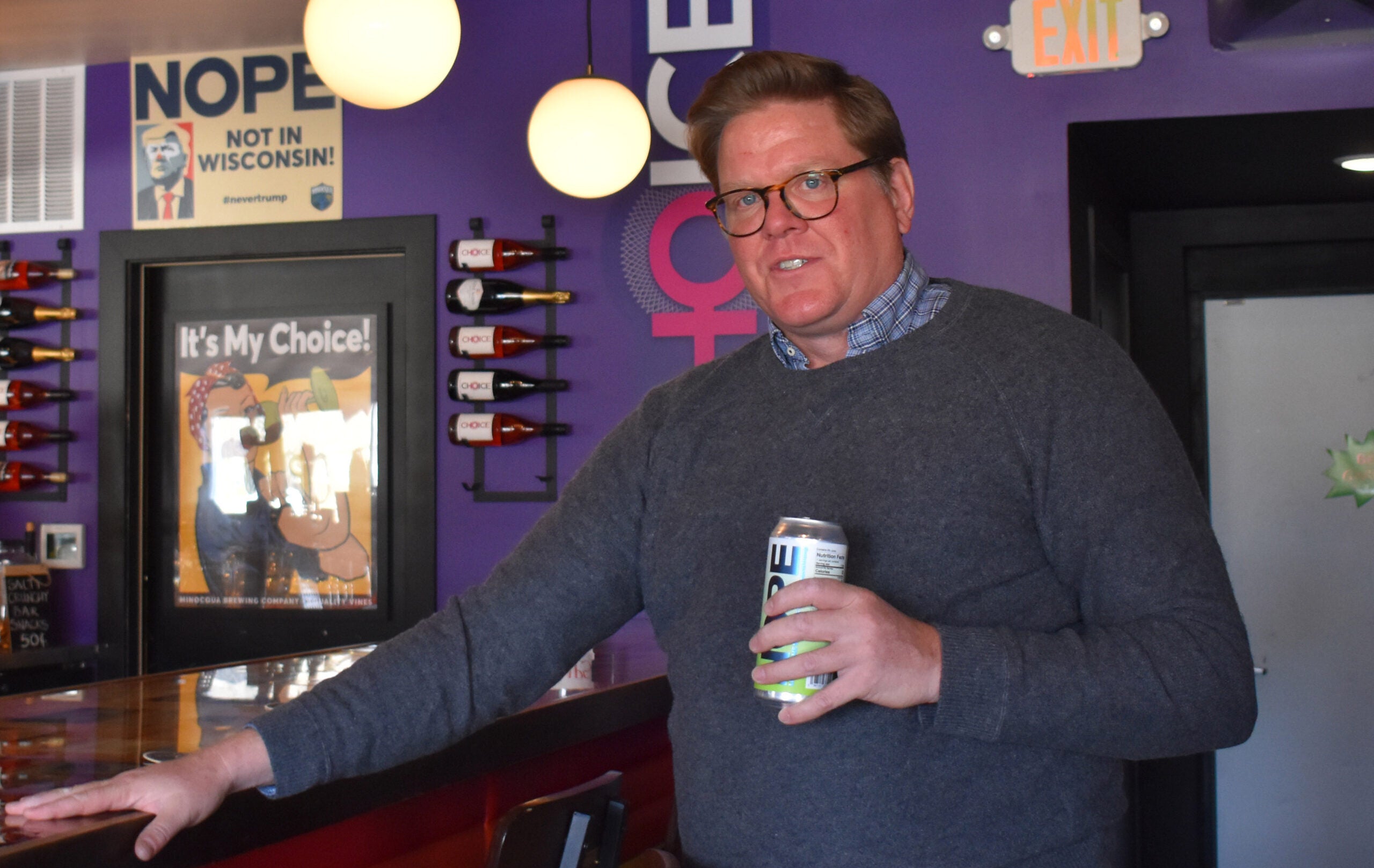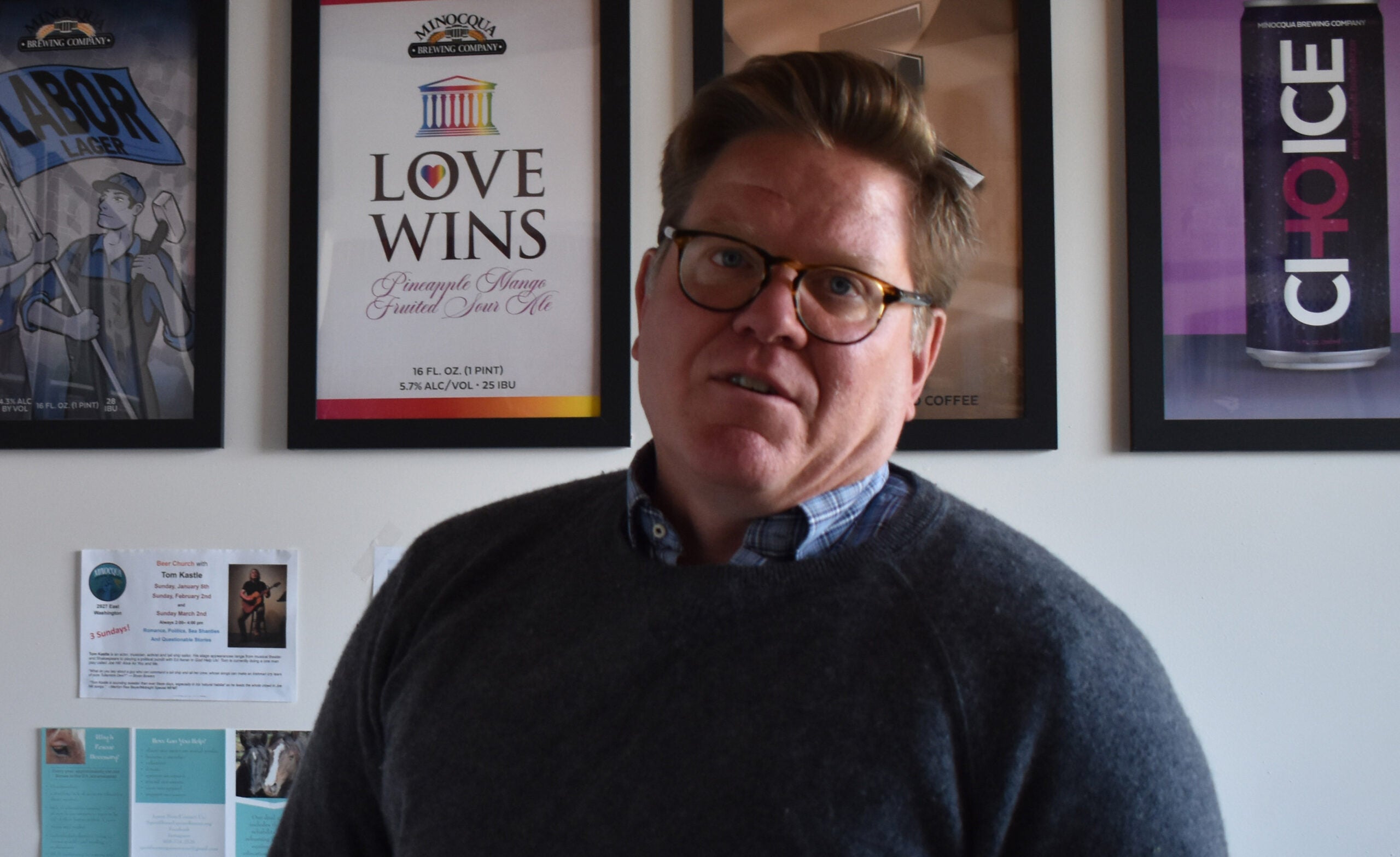In the Facebook post, the female editor of a Northwoods newspaper stands over the paper’s publisher. She is wearing the latex and rubber gear of a dominatrix and holding a riding crop. The publisher is telling her “whip me harder.”
The image is a Photoshop creation, with cartoon-style speech bubbles, and the post explicitly states that it is a parody. Still, it had a heavy impact on the editor, Heather Holmes of Minocqua’s Lakeland Times. She told police she “gasped” when she saw the post. She felt degraded by the image and afraid it would make her a target of attacks online or even in person. She had been sleeping with a knife near her bed, according to court documents.
The image was posted in August by Kirk Bangstad, owner of Minocqua Brewing Company and the affiliated Minocqua Brewing Company Super PAC, which advocates for liberal causes.
News with a little more humanity
WPR’s “Wisconsin Today” newsletter keeps you connected to the state you love without feeling overwhelmed. No paywall. No agenda. No corporate filter.
Two months later, Bangstad would be arrested and charged with criminal defamation in Oneida County. He is fighting the charges and says he believes Wisconsin’s criminal defamation statute is unconstitutional. He has petitioned to have a new judge assigned to the case, and is asking that the case be dismissed. The next hearing is in early April.
Bangstad’s business and his political activism are entwined, and a string of high-profile legal disputes have drawn media attention across Wisconsin and nationally. Within days of his arrest, he wrote that he had raised $20,000 in donations to the super PAC.
To some Wisconsin liberals, Bangstad is a minor celebrity, selling irreverent T-shirts, brewing beers themed around Democratic politicians and posting provocative, sometimes inflammatory essays online. He’s said his newsletters go out to a list of some 100,000 people.

He considers himself a “fighter,” he said in an interview. He paints himself as a crusader against “Republicans who I feel are feeding us misinformation and Democrats for not being strong enough.” He sees his adversaries as enemies of democracy and free speech. To critics, he is an online troll focused more on personal vendettas and self-aggrandizing publicity stunts than on changing public opinion in Northwoods Wisconsin.
Those who have worked with him say he can be impulsive and needlessly confrontational. A series of lawsuits filed by the super PAC aiming to change policy in Wisconsin have all failed. And a close look at the organization’s spending raises questions about how he is using his donors’ money.
This story is the product of more than a dozen interviews, including with people who’ve worked with Bangstad or interacted with him in Democratic Party circles in the Northwoods, as well as legal experts and officials. Some spoke on background because speaking on the record could jeopardize their current jobs. A few said they feared Bangstad’s ability to harass them online.
Bangstad spoke with WPR for more than an hour about his legal cases and political views, including financial and strategic decisions around his super PAC. But when WPR asked him for details on certain payments made by the PAC, he abruptly ended the interview.
Bangstad’s false claims online led to massive defamation judgment
Bangstad said the manipulated image of Holmes and Lakeland Times editor Gregg Walker was “obviously not in the best taste.” It was a response, he said, to a Lakeland Times editorial attacking a Minocqua-area teacher for teaching a book that includes a same-sex couple.
Bangstad has spent years feuding with Walker, whose newspaper’s editorial page once called Bangstad a “jackbooted liberal.” To mock Walker, Bangstad put Walker’s face on one of his company’s beers, called Snowflake Ale.
The August Facebook post came less than a year after Bangstad was found liable in a defamation lawsuit by Walker. Bangstad was fined $750,000 in that case, reportedly the largest defamation fine in state history. In October he settled the case for $580,000, mostly paid by his insurance company.
Walker told police he believed the image was in part retaliation against Holmes for testifying in the civil defamation trial. Holmes and Walker each declined to comment.
The Lakeland Times initially sued Bangstad in 2021 after Bangstad called Walker a “crook” and a “misogynist.” One legal expert said Bangstad’s odds of winning that case were high. The statements were confrontational but also likely to be classified by a judge as matters of opinion protected by the First Amendment.
But Bangstad did not stop posting about Walker. In August 2021, after Walker had filed suit, Bangstad wrote on Facebook that Walker “allegedly stood by and did nothing while his brother accidentally fell from a tree stand and died” because he “allegedly knew he would inherit the once-legitimate Lakeland Times if his brother was out of the picture,” according to court documents.
This wholly false claim would be added to the lawsuit and would result in the largest share of damages awarded to Walker in the case. Walker was a child at the time of his brother’s death and he was not present when the accident happened.
Bangstad said he had heard from a Minocqua resident that there was something “fishy” about the death.
“I think I made a bit of a leap,” Bangstad said, though he maintains he believed the content of the post at the time. “(But) I never said this is a statement of fact. I said, this is a story I heard. … I thought ‘alleged’ was a get-out-of-jail-free card at the time.”
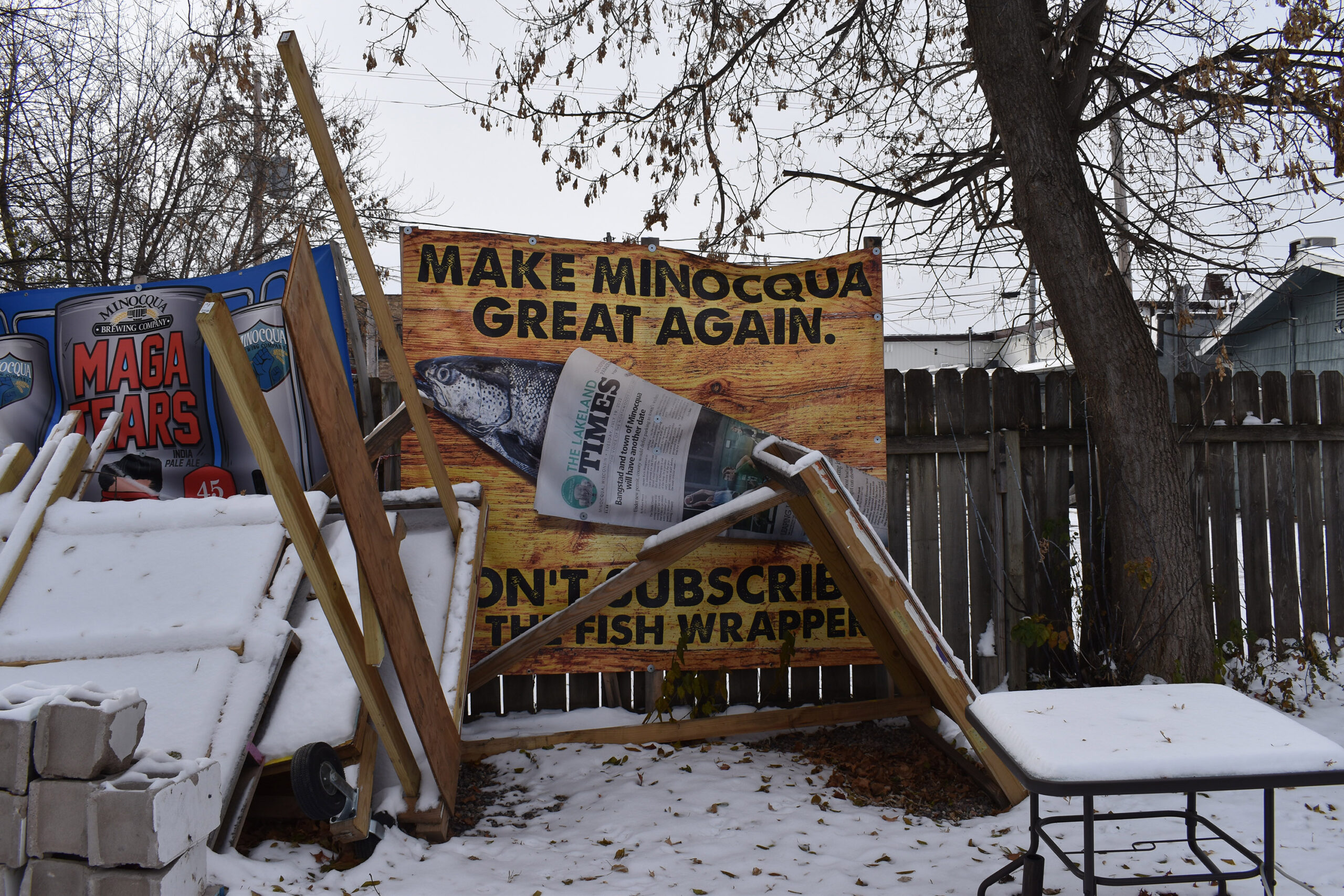
At the trial, Bangstad taunted Walker in the courtroom, the Lakeland Times reported. He was eventually found to be in contempt, fined and threatened with jail time when his disruptive behavior continued.
Bangstad calls the case a travesty of justice, and legal experts interviewed for this story did have criticisms of decisions made by Judge Leon Stenz.
But the jury’s decision in favor of Walker was unanimous. Bangstad, who has maintained that it is impossible for him to get a fair trial in a largely Republican county, said he sought to appeal but his insurance company had argued that his conduct was not covered under his policy and they should not have to pay. In a negotiated agreement, he paid $50,000 of the total damages.
“I can either go bankrupt for 50 [thousand] or I can settle for 50 [thousand],” Bangstad said in characterizing the choice he faced. “But that’s the only reason I made that decision, because to this day, I wish the Supreme Court would have taken [my appeal] because we need to fix these laws.”
Criminal defamation charges like the one Bangstad now faces are relatively rare, though legal scholar David Pritchard of Marquette University has tracked 337 of such cases in Wisconsin filed over 16 years.
In a 2009 paper, Pritchard found that criminal defamation was “largely a small-town crime, at least in Wisconsin. There were no criminal libel cases in the state’s most populous county in the 17 years under study.”
Bangstad said that’s evidence the law should be abolished. The American Civil Liberties Union also takes the position that the statute is unconstitutional.
But Pritchard, who worked as an expert witness on Bangstad’s side in the civil defamation trial, said that is not his view. For example, he said, a civil lawsuit is not an effective tool against someone who doesn’t have enough money to be concerned about damages.
“Despite what some may claim or wish, the First Amendment is not absolute,” Pritchard said. “Neither criminal nor civil libel is protected by the First Amendment.”
On Wednesday, Walker and Holmes filed a new civil lawsuit in Oneida County, naming Bangstad, Minocqua Brewing Company and the Minocqua Brewing Company Super PAC as defendants.
Before defamation charges, Bangstad fought yearslong zoning battles
The criminal defamation charges Bangstad faces now are not his only legal troubles in Oneida County. For years, he has been embroiled in a series of zoning disputes with the town of Minocqua over his business.
In 2020, Bangstad put a large banner supporting Democratic candidate Joe Biden for president on the side of Minocqua Brewing Company’s building. Authorities in the town said the banner’s size violated a local ordinance.
Bangstad, then a Democratic candidate for state Assembly, refused to take the banner down. He appealed to his followers online to help pay for legal fees and fines. He told the Wausau Daily Herald that the effort raised “way, way more” than he anticipated.
The controversy established a pattern Bangstad would return to repeatedly: Appealing to online supporters to help him fund efforts to fight local officials.
“Thank God I have 90,000 Facebook followers and a very large email list that I can ask them to help offset some of my costs from time to time,” Bangstad said in the interview with WPR. “I would have gone bankrupt other than that.”
On the eve of the 2020 election, both The Washington Post and The New York Times profiled the Assembly race for the stark contrasts between the two candidates, particularly on COVID-19 restrictions. Bangstad told the Times reporter that people in the region supported Trump because they “haven’t been equipped with the tools of media literacy or critical thinking skills.”
Bangstad lost his Assembly race against incumbent Republican Rep. Rob Swearingen. Later, he wrote that “losing that race was a foregone conclusion.”
In January 2021, he launched the Minocqua Brewing Company Super PAC.
“The Minocqua Brewing Company will commit 5 percent of its profits to donate to this super PAC,” Bangstad wrote in the announcement, “but like-minded citizens can also donate directly without buying a thing from us.”
Bangstad opened a retail store on Front Street in Minocqua, doing brisk business selling liberal-themed beers and political T-shirts to tourists. Some people who enjoyed the super PAC’s billboards attacking Republican U.S. Sen. Ron Johnson even made pilgrimages there, a former employee said.
Bangstad’s conflicts with town and county officials continued. He objected to zoning requirements that would have required him to pave the small parking lot and provide curb cut-outs accessible to wheelchairs. In 2023, the county briefly revoked the business’s operating permit. He sued the town of Minocqua in federal court, alleging that his First Amendment rights had been violated. That case was dismissed by a federal judge in June 2024.
“Everything is unfair, unfair, and it’s all about freedom of speech and his constitutional rights,” said Scott Holewinski, chair of the Oneida County zoning committee. “Basically, he figures if he throws that out there, that exempts him from following any other rules.”
Holewinski categorically denies targeting Bangstad due to his politics.
“He blames us that we’re all against him because of his political views, and that’s absolutely wrong,” Holewinski said. “None of us has ever said, ‘Well, we can’t do that because he’s a Democrat.’ We don’t do that.”
In the interview, Bangstad defended his style of rhetoric and his approach to conflicts.
“The things that matter to me most in life are seeing justice done and bringing order to chaos,” Bangstad said. “And probably I’m just a stubborn old Norwegian who just won’t let things go, because it pisses me off when I feel I’ve been treated wrongly or unfairly.”
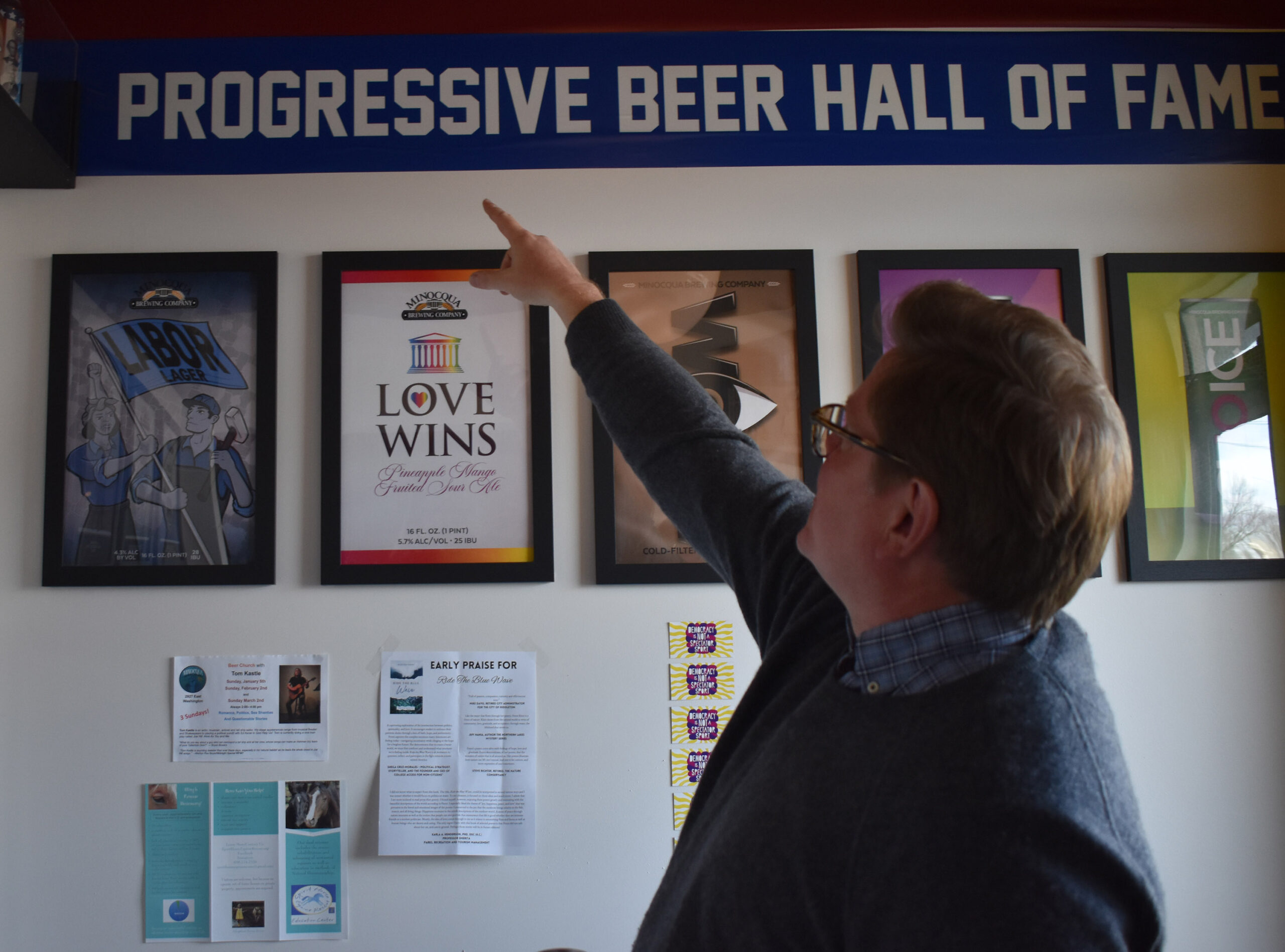
Bangstad said the conflicts with officials were a big part of the reason he moved to Madison several years ago. Last year, he opened the Minocqua Brewing Company Taproom on the city’s east side.
And he denied cultivating conflict for publicity.
“It would look from afar that, because I’m one of the few progressives that makes the news in northern Wisconsin on a regular basis, that I’m doing this to get my name out there,” Bangstad said. “I would disagree. I’ve been put through so much stress and so much financial pain. Why would I keep doing it?”
Minocqua Brewing Company Super PAC’s finances show unexplained expenses
The Minocqua Brewing Company Super PAC has sponsored a series of billboards in different parts of the state. It was behind a 2021 federal lawsuit that sought to compel masking in Wisconsin schools as a COVID protection measure; a 2023 lawsuit that aimed to end private voucher schools; and a January 2024 lawsuit aiming to block Republican Donald Trump from appearing on the ballot in Wisconsin.
All of these lawsuits failed. Bangstad himself petitioned the court to dismiss the masking lawsuit in early 2023; he said the justice system moved too slowly to implement sensible COVID restrictions in schools. In a unanimous decision, the Wisconsin Supreme Court refused to consider the voucher schools lawsuit. Bangstad blamed Milwaukee Democrats, who he said wanted to torpedo the effort. A Dane County judge dismissed the ballot challenge after the U.S. Supreme Court ruled against a similar lawsuit in Colorado.
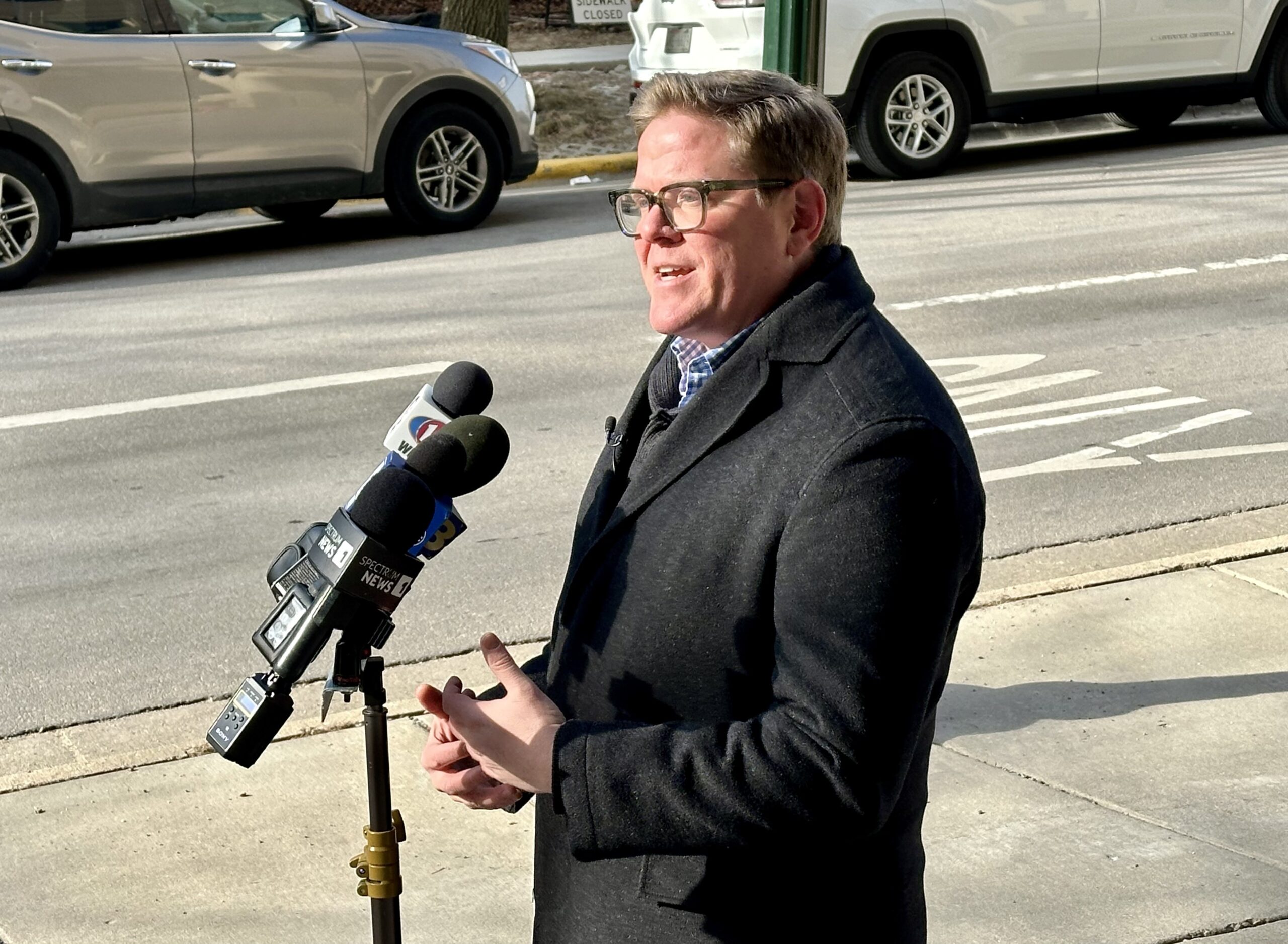
Bangstad said the work of preparing and filing the policy-oriented lawsuits accounted for the “vast majority of what we spent with the super PAC, because getting good lawyers to do this work is very expensive.” In fact about one-third of the PAC’s payments in the 2023 and 2024 went to legal services, according to Federal Election Commission disclosure forms.
According to the campaign finance disclosure forms submitted by Bangstad, the super PAC took in about $1 million in the two-year period. It spent roughly that much as well. The billboard spending frequently touted by Bangstad accounted for just $35,147, less than 4 percent of the PAC’s disbursements. It paid about $80,000 to Facebook for digital advertising.
According to Meta’s ad library, which catalogs Facebook ads, most of these were promoted posts featuring Bangstad’s newsletters and a few were promotions of brewing company products. The PAC also promoted two posts advertising free music nights across Wisconsin sponsored by Minocqua Brewing Company in conjunction with groups including Planned Parenthood and Citizen Action, branded as get-out-the-vote events for Democratic presidential candidate Kamala Harris.
The PAC did not make independent expenditures on behalf of any candidate.
And another one-third of the PAC’s disbursements in the two-year period — $333,890 in all — went to Effervescent Blue and NCPS, two organizations that have no online footprint and for which information was not available.
Effervescent Blue received $167,404 from the Minocqua Brewing Company Super PAC, all classified in the categories of advertising or digital advertising. Effervescent Blue does not have a website, and the address listed on FEC disclosure forms is a jewelry store in Madison. When two digits of the listed address are transposed, it is the address of a UPS Store, which offers post office boxes.
Similarly, NCPS received $166,486 from the PAC during the same time period. Some of the payments to NCPS are classified as going to billboards, digital advertising or Facebook ads. More than $117,000 paid to the organization is classified as going to “strategic consulting services.” Its address is a UPS Store in Milwaukee.
Neither organization is registered in Wisconsin, and according to the FEC’s campaign finance database the Minocqua Brewing Company Super PAC is the only political group to have paid either organization in the two-year window.
“That question is out of bounds,” Bangstad said in the interview when a reporter asked him for information on Effervescent Blue and NCPS. “My political dealings and my super PAC have put a huge target on my back by the Republican Party. I will never give any information about how I’m trying to keep Wisconsin blue because this is a vicious political environment out there in Wisconsin. So the fact that you asked that question suggests that you are part of the Republican Party that’s trying to hurt my super PAC and trying to hurt my political activism.”
Bangstad said the question had “crossed a line” and threatened to end the interview if WPR persisted with questions about the payments. He briefly claimed to be speaking off the record, then declined to answer any further questions.
As WPR left, he stood behind the bar in the empty taproom.
“You’re doing a disservice to your country and a disservice to the fourth estate,” he said. “That’s on the record.”
Campaign finance experts said there are few checks on super PAC finances.
“It’s hard for the Federal Election Commission to catch everything,” said Brendan Glavin, deputy research director for the nonprofit Open Secrets, which tracks political spending. “They’re not going to flag something that is being reported on time and all the donor information is being properly reported and they’re showing the expenditures.”
An attorney who specializes in campaign finance law said the Effervescent Blue and NCPS payments did seem unusual, but it is conceivable they were made to political consultants who wanted to mask their involvement with Bangstad’s super PAC.
In general, experts said, there is little enforcement of federal regulations around super PAC spending. One expert suggested that the only recourse is if donors perceive that the PAC is not spending their money effectively, they may stop donating.
As his criminal defamation case proceeds, Bangstad continues to wage battles against Oneida County officials. In October, he defied a judge’s order forbidding him to post about the criminal defamation charges. Soon after he made that post, police say one of Bangstad’s online followers sent a threatening email to the judge assigned to the case.
In December, the Lakeland Times reported that Bangstad filed a claim asking Oneida County to pay him $10.7 million in damages; the claim is a precursor to a potential lawsuit. And on Thursday, the Oneida County Board of Adjustment will hear his appeal of a new revocation of his conditional use permit.
Editor’s note: This story has been corrected to reflect that the address listed in FEC documents for Effervescent Blue is a Madison jewelry store.
Wisconsin Public Radio, © Copyright 2025, Board of Regents of the University of Wisconsin System and Wisconsin Educational Communications Board.

